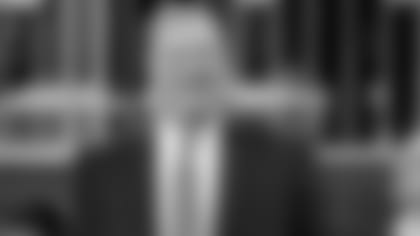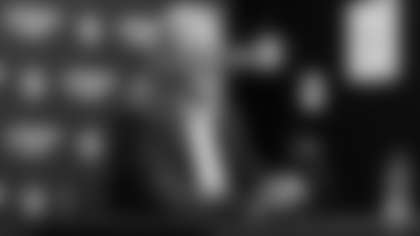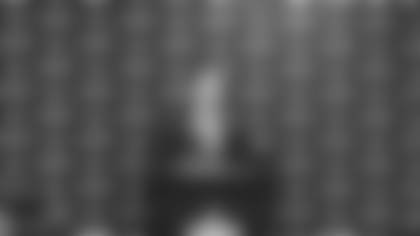Nine years ago today, Dennis Lauscha was named president of the New Orleans Saints. It's been quite the ride for the New Orleans native, as he's had to guide the organization through one challenge after another all the while keeping things focused on achieving on-the-field success. Dennis sat down with senior writer John DeShazier this week to look back at his tenure and what he hopes to accomplish in the future.
DeShazier: You're a native New Orleanian, grew up a Saints fan. Did you envision working for the team, in any capacity, growing up?
Lauscha: I was a gigantic fan growing up. I watched all the games on Sundays, listened to them on the radio. My envisioning my working here was more as a starting quarterback vs. the president (laughing). But it's a dream come true, no question about it. As a kid who grew up in New Orleans, I could not think of a better job to have on planet Earth. It's been an honor.
DeShazier: When you circle back, what position were you hired for, what was your role and what did you foresee for the franchise going forward?
Lauscha: Before I started working here, I worked for an accounting firm and we would do the salary cap audit, and I got to know the prior CFO, a gentleman by the name of Bruce Broussard. We had a great working relationship and, sadly, he was diagnosed with Lou Gehrig's Disease, and they had to replace him. I went through the process and my original position was CFO, or "Treasurer," is what they called it back then (in 1998). I was 28 years old, and I've joked about this in the past: Up until and I guess right until (late owner) Tom Benson's last few months, I would ask him, Why did you select me at 28 years old? And I finally said, 'I think I know why. I was so much cheaper than everybody else.' He never did say, he just started laughing.
DeShazier: When you come on as CFO, do you have aspirations of being team president?
Lauscha: I think my aspirations at that time was just how could I contribute, and how could I just learn the business and learn everything about the business. I had a pretty good jump start, knowing about the salary cap and actually knowing about the financial statements, because I was auditor of the financial statements and some other things as well. But I think just trying to be a good team member, trying to contribute, trying to help, trying to figure out really how major league professional sports works. The beauty of it was that Mr. Benson was there from the very beginning. I think the special thing with our relationship was in the beginning, he really did encourage me to give my opinions. And if I did disagree, respectfully disagree, but he really did encourage me to be heard and to speak up and to bring ideas to the table. And that, I think, went a long ways.
DeShazier: You always hear that if everybody is saying 'Yes,' that's probably not a good thing.
Lauscha: Yep. And I think that was different in some ways. I think for a big part of his career, he had a lot of folks that always said, 'Yes.' And maybe it was a little bit refreshing, and I tried to do it always very respectfully, but I always try to bring up another opinion. And I think he appreciated that.

DeShazier: Fast forward to taking over as president. What was the state of the franchise at that time?
Lauscha: Actually the franchise was in pretty good shape. We had just acquired the Pelicans, and so a lot of our attention was really focused on the Pelicans at that time and I became president of the Pelicans. Really was just about learning the process of NBA basketball, learning the differences. So it was quite a challenge, merging the two companies. I'm proud of the fact that other than one person that left, I think everyone else in the organization stayed. We welcomed everyone in the organization to stay, so the transition went fairly well. So it was a challenge but at the end of the day, it was a good acquisition and a good merger.
DeShazier: Was it a night-and-day difference between the NFL and NBA, or was it simply a matter of an increased workload while figuring it out?
Lauscha: I would tell you, in many respects, it's night and day. It really is. I think one of the surprising things you have when you get to the NBA, you realize very quickly that you've got to be on your 'A' game locally. You've got to sell tickets; the sale of tickets is so much more important. Being a small-market team in the NBA has a number of disadvantages. You hear about so many of those disadvantages, whether it's what you get paid for your local television rights, or what you're able to sell in your local market. All of those things are big challenges. It made us a much, much, much better football team, because many of the things we learned in the NBA – best practices – we exported over to the NFL, and I think it made us a much better team.
DeShazier: Walk us through a few of the major challenges the franchise has encountered during your tenure.
Lauscha: There's been a lot in my career here. Really, when I started in '98, one of the big things that was on the agenda was trying to find a long-term lease agreement with the state, and a stadium solution. That was a challenge that really lasted until Hurricane Katrina, in many respects, which was the next challenge. Katrina was big. We've also had Bounty-gate, now we've had Covid. And then you've had some macro issues as well, which would have been like lockouts, labor disputes, those types of things. Those things take a lot of time and a lot of preparation and planning for. And then, obviously, Mr. Benson's passing and then the transition to Mrs. Benson. I think if there's one constant, that constant is change. From one challenge to the next challenge, but we always get through them pretty well.

DeShazier: Mr. Benson's passing, how vast was that? Because he was the face that everyone associated with the franchise. They'd gotten accustomed to seeing Mrs. Benson, but he was the face.
Lauscha: It was certainly challenging, losing the patriarch. I think offsetting that was just how amazing a woman Mrs. Benson is, and how much she brought to the table. People forget, she had been in the organization for a very long time at Mr. Benson's side and really had learned a lot along the way. She was great in that transition. If that had not been the case, it probably would have been a lot more difficult but really, you had someone who had been at his side for I guess over a decade or so, who had really learned from him a lot. What she set out to accomplish was many of the goals that he had and really very reflective of what me and our entire leadership staff thought was important and what we wanted to accomplish. So the transition was very good.
DeShazier: When the organization has gone through a crisis, what's the central theme to keep it going in the right direction?
Lauscha: I think if you have good people, you're going to have a leg up. Having said that, I think communication is so important. We've learned in Covid, communication and teamwork I think we've taken to the next level. The other thing, I'll go back to people for a second, and I mean this sincerely: By no means do I want to see tragic challenges in my career going forward. But when you have good people – and good people not only on the business side, but particularly on the football side of the organization – sometimes it's an advantage. You can get through these challenges better than other teams can get through these challenges, you can get through these challenges better than other companies can get through these challenges. When you have a strong team, you're willing to take on the big challenges and you look at them as opportunities on how we can be better and separate ourselves from our competition. Having great people gives us a really big advantage.
DeShazier: Football operations is the visible side, business ops is kind of behind the scenes. What measure of pride do you take when you see the success on the field?
Lauscha: I would say everything we do on the business side is to support the football side and making sure that they win. Winning is absolutely the most important thing that we can do in this organization. We have seen that consistently over the years. You win, and good things happen. I think the more we can assist on the business side to put our football team in a position to win, the better that we're going to be. If you look at all of our gameday entertainment and what we do in the stadium, all of those things are really focused on trying to make sure we win. And luckily, I have a great relationship with (Executive Vice President/General Manager) Mickey (Loomis) and the football side. We joke and you hear football side and business side – I'd like to think that there are no sides, that we truly are together in this. And I think that's the way we really feel in this organization. Mickey has been outstanding to work with, (Coach) Sean (Payton), everyone on the football staff, they're great to work with. And so, really the focus is winning.
DeShazier: In nine years as team president, what are the biggest changes you've seen in the league?
Lauscha: The great thing about the NFL – and really, the NBA for that matter – is that we have great content. The question is going to be, How are we going to distribute that content and how are people going to consume that content? In this ever-changing world, talking about changes are good, I would suggest that at the end of the day, as long as we continue to put good content out there, we're going to be in a good position. But having said that, the way the world is changing with regards to technology, the way some of the trends we're seeing with some younger demographics, it's going to be a real challenge to keep those people engaged, whether it's TV or digitally or even in the stadium itself. So we have to make sure that we're providing the best product that we possibly can to keep those folks engaged. And I think that's where our challenge is.
DeShazier: Has the pandemic led to any learnings that will make the teams better?
Lauscha: I really believe communication and teamwork has been great. The level of communication we had three, four, five years ago – we talked a lot about communication, we talked about how we can be better, we talked about teamwork. But really, I would tell you that because of Covid, all of that stuff really came together in a way I hadn't envisioned. And it's for the best, and we're going to have to continue to do that, and we will.

DeShazier: Will we have full attendance at Saints games this season?
Lauscha: I 100 percent expect full attendance, and everyone rockin' and rollin' and cheering our team on to victory. Absolutely.
DeShazier: How important are vaccinations in that process?
Lauscha: Obviously, it's really important. We've got to get these vaccinations to get to herd immunity, at least community immunity, or get us to a comfortable place. As much as we can do to encourage vaccinations, we'll continue to do it. It's one of our No. 1 priorities.
DeShazier: There's lots going on at the Mercedes-Benz Superdome. Walk us through some of the changes that have happened this offseason and some of the changes fans can expect.
Lauscha: I guess we start off by saying how important that building is to our success, and really how important that building has been to this franchise. I like to think, as we've gone through these changes that (architect) Arthur Davis and (New Orleans football founding father) Dave Dixon and all the fathers of the Superdome would be very proud of what we're trying to do to continue to make this building viable. Growing up, I adored the Superdome. It was such a big thing for me growing up here. I kind of remember it being built, remember the first commercials, remember everyone talking about it, remember about it being the biggest dome in the world and it was in our back yard. And how important it was for New Orleans and the state of Louisiana. That building means a lot to me, I know it means a lot to our fans, and so we have to do what we can to keep it relevant and keep it updated. That's really what this renovation is about. There will be a lot of front-facing improvements, but also there will be a lot of back-of-house improvements just to keep the building operating. What Dave Dixon and Arthur Davis never imagined were things such as Covid or security measures or making sure that all of our patrons – disabled patrons and others – could have equal access to seating so they can participate in a game. All of those things, we're trying to incorporate now into the Superdome to make it a better building. But this year we'll have our floor-level suites, we'll have some standing-room only areas that will be open and as we continue to move on, you'll see our club levels significantly expand, you'll see our entrances significantly expand. I honestly can say this: It will continue being a cutting-edge building. It'll be the best stadium in the National Football League when we're finished.
DeShazier: Can you talk about naming rights for the stadium yet?
Lauscha: We're working on it. We have engaged with a number of companies, but I think we're getting very close and at the appropriate time, we'll make an announcement. But right now we have a deal with Mercedes-Benz, it'll last a little bit longer through the summer, and then we'll be prepared after that to make an announcement.
DeShazier: Schedule just came out, which games are you most excited to watch?
Lauscha: Every single one. I just can't wait. I'm always particularly psyched up and geared up for our rival games, particularly Atlanta this year. I was very close to and admired (former Saints director of pro personnel and current Falcons general manager) Terry Fontenot very much. I'm extraordinarily happy for him that he's having the opportunity to be a general manager, no person I know is more deserving than him. Sadly, though, he went to our rival. So I look forward to those games.
DeShazier: This will be the first season with 17-game regular season. What are your thoughts on adding a game and subtracting a preseason game?
Lauscha: It's interesting because it's going to completely change the dynamic of what we've been used to for the last couple of years. I kind of go back to what I said earlier: I think we'll have an advantage. And I think we'll have an advantage because we have a great coach and a great coaching staff and a great GM who are going to be prepared in a way that perhaps other teams won't be prepared. But I think the league heard very loudly that fans did not want four preseason games, and so that's where we're at.
DeShazier: Will fans be able to come to training camp?
Lauscha: I hope it'll be back to normal. We're planning for that. Ultimately, it may be a little bit different as it relates to the NFL and the NFLPA discussions on how training camp should be handled. Assuming that gets worked out, then I expect us to have a full training camp.
DeShazier: What do you envision for the future of the franchise?
Lauscha: One of the things we always say is we want to be No. 1 in everything we do, and I mean that sincerely, and I'm very proud that we're No. 1 in many, many things, particularly on the business side. That really is a tribute to the employees that we have here. But how do we separate ourselves now from No. 2? How do we put more distance between No. 2 and No. 1? That's always what you're looking for if you're No. 1. If you're not No. 1, you're pushing to be No. 1. Innovation, we talked about how do we continue to evolve and how do we continue to evolve in a way that separates us from our competitors. We're in a small market. I love that we're in a small market because we have passion in this market for both of these franchises. I love having that chip on my shoulder and our employees having the chip on their shoulders that, 'We're better than anybody else, regardless of the size of the city.' And we'll continue to work very hard to make this city proud. We know that there's a significant responsibility associated with that and we'll continue to try and make the city proud.
DeShazier: Do you have a message for fans you'd like to share?
Lauscha: You have my promise that we're going to do everything we possibly can to make sure that you're proud of the organization, and that this organization is here for your generation and your children and grandchildren's generation. That's what we're trying to accomplish here. I assure you we have great people here that are all pulling in that direction. Keep supporting us and I promise you we'll be loyal to the city and the community, and we'll keep on giving back whenever we can. I think that's just what's so unique about our franchise and our city.
















